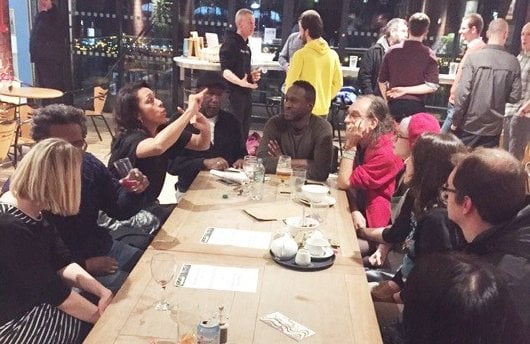
Sign of the times
Watershed in Bristol has learnt from its customers with hearing impairments how to be more welcoming, including by learning basic signing. Louise Gardner tells the story.
At Watershed we want to be as welcoming, inclusive and accessible as we can for everyone. Over the past year, we have been making some really positive changes for our deaf and hard-of-hearing customers. It has proved that co-production, creativity, innovation and a little bit of practice can help reach sections of the audience not consistently catered for.
Like many deaf and hard-of-hearing customers, David finds that at a lot of the venues he visits there is no initial welcome that is accessible for him
Last year we participated in Arts Council England’s An Agent for Change programme, which explored how arts organisations can be more inclusive. We were matched with David Ellington, a deaf, British Sign Language (BSL) user, filmmaker and artist, and set out to look at three key areas: staff training, communications, and programming and events.
Awareness and signing
We began to train our staff in deaf awareness and basic BSL to build accessibility into our cinema programme and to look at our communications to ensure we could reach this community.
We asked deaf and hard-of-hearing customers some questions, by running focus groups and conducting quantitative research, to help us understand what the barriers to attendance were and also to get to know each other. David’s help and insight was paramount to the success of this process.
Like many deaf and hard-of-hearing customers, David finds that at a lot of the venues he visits there is no initial welcome that is accessible for him. If your first language is BSL but a venue does not have an introduction in BSL, it is like they are saying you are not that important.
One of the first things we did was to create a welcome video in BSL that is on a loop in our box office and reception area. David and other customers had said that if there’s a video in BSL it signals a level of deaf awareness among the staff and that maybe some have acquired a basic knowledge of BSL and can communicate with them.
In David’s experience most staff at venues do not sign, make eye contact or try to gesture, and deaf customers inevitably find themselves faced with communication difficulties. When staff learn basic BSL or fingerspelling it means customers like David have a better experience and interaction.
Talks and events
We were keen to make sure that what we offer is inclusive, so instead of introducing something new purely for our deaf and hard-of-hearing audiences we worked with David and our audiences to ensure that access to talks and events and opportunities to discuss the films and programme were more regular for our deaf and hard-of-hearing customers.
The outcome of this is Deaf conversations about Cinema, a monthly relaxed, informal opportunity for the deaf and hard-of-hearing, as well as hearing customers, to come together to talk about a film in our programme (following a descriptive subtitled screening). We usually invite a guest speaker to give a short introduction to the screening and then we meet up in the bar with two BSL interpreters for signing, chatting and sharing our thoughts.
We also ensured our staff had the necessary tools and training. So far we have trained over 50 staff in deaf awareness and basic BSL, and have improved our communications and website, and now produce regular BSL video translations.
Sharing practice
We’ve got to a stage where creating an accessible offer has become a regular part of our programme. We have been sharing our practice and learning with other venues in the south west of England and further afield, and in turn have gained knowledge and insight into how else we can continue to improve.
We want to share our learning and the resources we have created. We have a video library of our staff demonstrating BSL phrases and undertaking simple role-play such as selling a cinema ticket to a deaf customer and telling them which cinema the film will be in.
We had a lovely moment at last year’s BSL Celebration Day where the training went full circle as bar staff were teaching cinema-goers how to use BSL to get the discount on their drinks that we’d arranged.
It’s been a brilliant journey and we have continued working with David beyond the funded period as it is now fully embedded in our programme and our thinking. So go on, test us – we’ll show you how to sign your name.
Louise Gardner is Head of Communications at Watershed.
www.watershed.co.uk
Join the Discussion
You must be logged in to post a comment.